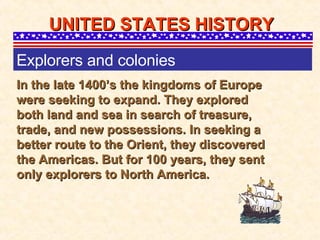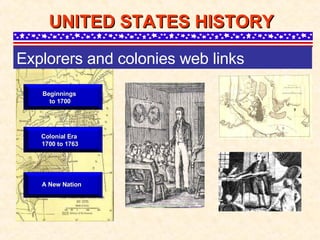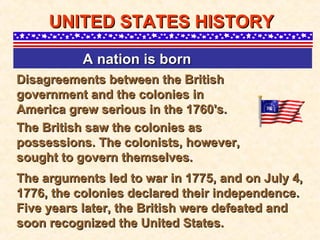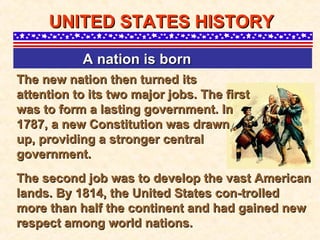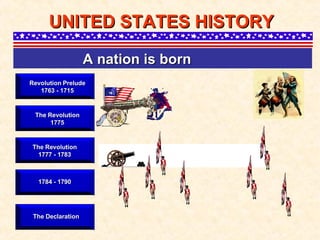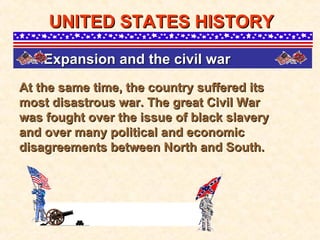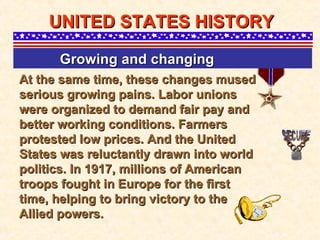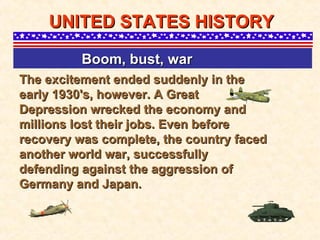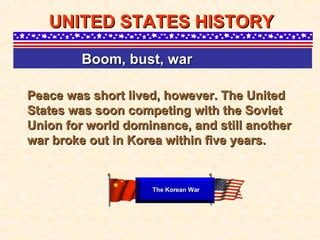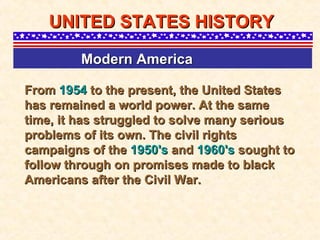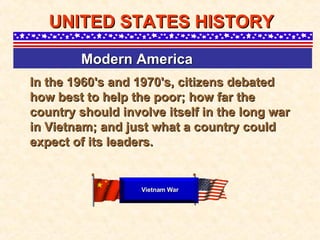United States History
- 1. Descendants of the American Indians arrived in North America perhaps 10,000 years ago from Asia. By 1500, there were some 1.5 million of them in North America. They were divided into hundreds of tribes, spoke many different languages, and kept no written records. UNITED STATES HISTORY Explorers and colonies
- 2. In the late 1400’s the kingdoms of Europe were seeking to expand. They explored both land and sea in search of treasure, trade, and new possessions. In seeking a better route to the Orient, they discovered the Americas. But for 100 years, they sent only explorers to North America. UNITED STATES HISTORY Explorers and colonies
- 3. Then, beginning in 1587, the English began serious attempts to send colonists to the new lands. Within 200 years, there were nearly 4 million Europeans along the Atlantic coast, forming the nucleus of what was soon to become the United States. UNITED STATES HISTORY Explorers and colonies
- 4. UNITED STATES HISTORY Beginnings to 1700 Colonial Era 1700 to 1763 A New Nation Explorers and colonies web links
- 5. Disagreements between the British government and the colonies in America grew serious in the 1760's. UNITED STATES HISTORY A nation is born The British saw the colonies as possessions. The colonists, however, sought to govern themselves. The arguments led to war in 1775, and on July 4, 1776, the colonies declared their independence. Five years later, the British were defeated and soon recognized the United States.
- 6. The new nation then turned its attention to its two major jobs. The first was to form a lasting government. In 1787, a new Constitution was drawn up, providing a stronger central government. UNITED STATES HISTORY A nation is born The second job was to develop the vast American lands. By 1814, the United States con-trolled more than half the continent and had gained new respect among world nations.
- 7. UNITED STATES HISTORY A nation is born Revolution Prelude 1763 - 1715 The Revolution 1775 1784 - 1790 The Declaration The Revolution 1777 - 1783
- 8. The period from 1815 to 1880 was one of amazing growth for the United States. Huge parts of the continent were settled; millions of new immigrants arrived from Ireland, Germany, and many other countries. UNITED STATES HISTORY Expansion and the civil war The nation became increasingly connected by new roads, canals, railroads, and telegraph wires. By 1880, the United States had acquired all its present territory except Hawaii.
- 9. At the same time, the country suffered its most disastrous war. The great Civil War was fought over the issue of black slavery and over many political and economic disagreements between North and South. UNITED STATES HISTORY Expansion and the civil war
- 10. For four years, the nation was divided, and brother fought against brother. Finally the North won, and the country was reunited, but scars of the war took decades to heal. UNITED STATES HISTORY Expansion and the civil war
- 11. Between 1890 and 1920, the United States changed from a pioneer nation to a world power. Huge industrial empires produced coal, steel, and oil. Inventors perfected the use of electricity, and such conveniences as the telephone, the phonograph, the automobile, and the airplane. The government began assembling an empire of possessions in Asia and the Caribbean. UNITED STATES HISTORY Growing and changing
- 12. At the same time, these changes mused serious growing pains. Labor unions were organized to demand fair pay and better working conditions. Farmers protested low prices. And the United States was reluctantly drawn into world politics. In 1917, millions of American troops fought in Europe for the first time, helping to bring victory to the Allied powers. UNITED STATES HISTORY Growing and changing
- 13. Between 1920 and 1954, the United States grew into the most prosperous land on Earth. During the 1920’s the country turned away from world affairs and found excitement at home the popular entertainment of radio and the movies, jazz, and the promise of ever greater prosperity. UNITED STATES HISTORY Boom, bust war
- 14. The excitement ended suddenly in the early 1930's, however. A Great Depression wrecked the economy and millions lost their jobs. Even before recovery was complete, the country faced another world war, successfully defending against the aggression of Germany and Japan. UNITED STATES HISTORY Boom, bust, war
- 15. Peace was short lived, however. The United States was soon competing with the Soviet Union for world dominance, and still another war broke out in Korea within five years. UNITED STATES HISTORY Boom, bust, war The Korean War
- 16. From 1954 to the present, the United States has remained a world power. At the same time, it has struggled to solve many serious problems of its own. The civil rights campaigns of the 1950's and 1960's sought to follow through on promises made to black Americans after the Civil War. UNITED STATES HISTORY Modern America
- 17. In the 1960's and 1970's, citizens debated how best to help the poor; how far the country should involve itself in the long war in Vietnam; and just what a country could expect of its leaders. UNITED STATES HISTORY Modern America Vietnam War
- 18. The Cold War with the Soviet Union continued with confrontations in Berlin and in Cuba. But gradually attention shifted to crises brought on by smaller countries, such as the oil crisis brought on by Arab nations in the Middle East and the painful hostage crisis in Iran. UNITED STATES HISTORY Modern America


